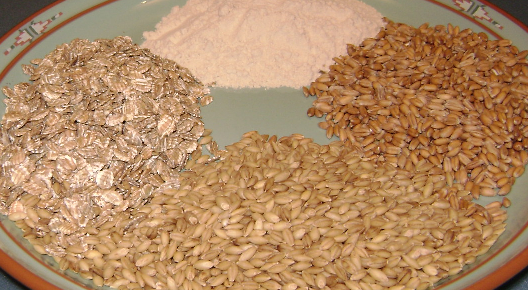 |
| These things have gluten. |
I’m married to a chemistry professor, so I have no excuse. When James mentioned how many people didn’t know what gluten is (other than “some bad thing I don’t want in my food”), I adopted a chirpy voice and said, “it’s a protein made without harming any innocent little animals.” Ironically, past food fads suggested increasing gluten consumption. Macrobiotic diets recommended vital wheat gluten as a food item. You can also use gluten to increase the chewiness of bread. I add a little gluten to the dough when I make a whole-wheat and rye bread, just so it can have some gluten and do a little rising.
But even for someone who isn’t worried about gluten at all, some of the dishes listed in the article got me somewhat curious. On the one hand, the chickpea pappardalle at Felida sound interesting. However, I’m not sure if I can agree with Lidia Bastianich:
I think that every big food tsunami that comes along, it leaves ripples of an aftereffect, which is good. There’s a reality out there of all these allergies. Our bodies are reacting to something in how we eat.I’m not going to complain about innovative use of ingredients. I might try making chickpea pasta myself, just because. But are the allergies a reality? Are “our bodies reacting to something in how we eat”? Or have people taken their food fears and preferences and raised them to the level of allergy? I know there are some real food allergies out there. Then there are a lot of people with self-diagnosed food allergies who don’t have the symptoms of allergies or intolerances. Severson writes that the gluten-free diet
is used by people who want to lose weight, reduce inflammation, curb fatigue and ease other conditions, or because it helps them avoid highly processed grain. Many simply say they feel better without it, though there is not yet much scientific evidence to back up the claims.It certainly helps them “avoid highly processed grain.” And slightly processed grain. And minimally processed grain. But there doesn’t seem to be any (which is slightly less than “not much”) evidence that a gluten-free diet will accomplish the wonders attributed to it. Or, as in the caption of the New Yorker cartoon she cites,
I’ve only been gluten-free for a week, but I’m already really annoying.Americans obsess about food; we’ve been doing it for a long time. This is not the first time that someone has advocated eating in a certain way to increase health and longevity. John Harvey Kellog was certain that a largely vegetarian diet would do all these things, and reduce sexual urges too (he was against sexual urges for a while).
The article concludes with sage advice from Marion Nestle, a professor of nutrition at NYU.
There really isn’t much better dietary advice than eating your veggies, exercising and limiting calories. People just seem to like making eating difficult for themselves.
No comments:
Post a Comment